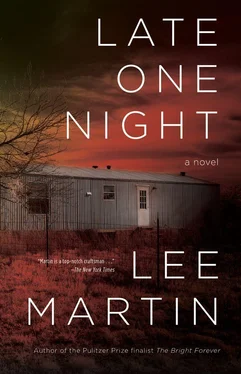He waited, barely able to look her in the eyes. “You’re not going to want to hear everything there is to say.”
“Maybe not.” She took a deep breath and let it out. “But it’s too late for secrets now. Tell me.”
So first there was the telling, and then before Brandi could decide what she believed and what she didn’t, she heard footsteps on the porch and a sharp knock on the front door.
Ronnie squeezed her hand — he’d held it the whole time he told his story — and she had to tug hard to get free from it.
She opened the door, and there was Biggs and two deputies. Biggs didn’t say a word, didn’t acknowledge her at all. He just stepped into her house and said to Ronnie, “I’ve got enough evidence to arrest you, and we’re going to search this property.”
Ronnie said, “Then do it.”
“Ma’am,” the tall deputy said to Brandi. He had a long neck, and there was static electricity in his thin hair, making it stand on end. “We’ve come with a warrant.”
The shorter deputy handed it to her. He was red in the face from the cold. He moved his feet about on the front porch.
“What’s this mean?” she said.
“Means we’re here to search the premises,” said the tall deputy. “We’re here to remove any items that might serve as evidence in the matter of the arson at Della Black’s trailer on the night of January tenth.”
She looked at them, still not quite understanding.
“Ma’am,” said the shorter deputy, “you really don’t have any choice.”
She understood that. She stepped aside and let them in.
By noon the next day word was running around town. Ronnie Black was in custody. Maybe all that gossip? That gossip about him having something to do with that trailer fire? Well, maybe it wasn’t gossip at all. Maybe it was gospel.
“You wouldn’t think it’d be possible,” Roe Carl kept saying to folks who came through her checkout line at Read’s IGA. “But, lordy, these are strange times.”
Certain facts had come to light, and now folks were passing them around tables at the Real McCoy. Anna Spillman listened in as she served lunch platters and refilled coffee cups and iced tea glasses. The investigators from the State Fire Marshal’s office had found footprints in the muddy ground where the fire had melted the snow cover and thawed the frozen earth. A man’s footprints. The ridged tread of work boots. Those prints were frozen into the ground now, just under the fresh snow. You could drive out the blacktop and see them if you took a notion. They’d be there until the thaw came in the spring. The investigators had made plaster casts of those prints, and Sheriff Biggs had them in his office now. That was as true as true could be.
It was also true that Della’s furnace had been acting up, but her daddy had it running fine the day of the fire. Wayne Best had told the investigators as much, and sure enough, when they gave it a look-see, they could tell it hadn’t malfunctioned that night. Nor had the Franklin stove, which Wayne said Della was using, been to blame.
But one fact stood out as a cruel irony. Overlooked at first by investigators, a cardboard box containing wood ash, surely from the Franklin stove, finally got noticed behind the trailer.
When the fire erupted, the points of ignition had been along the back of the trailer, far from the front corner where the stove was — multiple points of ignition near the back door off the kitchen.
Ronnie had filled up a five-gallon gas can at Casey’s the morning of the fire. Taylor Jack reminded everyone about that. He’d been the one to take Ronnie’s money. “You running something?” Taylor asked, and Ronnie said that Brandi had run out of gas on her way to work, and he was carrying some to her. That all made sense, Taylor said later, but how come Ronnie came back the night of the fire to buy five gallons more?
The diner went quiet when Taylor Jack told that part of the story, and even Anna Spillman, who’d always felt sorry for Ronnie and even let him stay with her, had to admit that the unthinkable was possible: Ronnie Black might have burned that trailer, not caring a snap who was inside.
Laverne Ott and the State of Illinois were moving forward. Missy and Pat passed their medical exams and their criminal background checks. Lois and Wayne confirmed that they weren’t in a position to care for the girls and that their wish was that Missy and Pat be granted custody.
On the day of the sheltered care hearing, the judge considered the evidence: a father under investigation for the arson that had killed his wife and three of their children, the story of how that father had tried to run a van off the road knowing that his daughters were inside.
Laverne was there to answer questions concerning her inquiry, and as much as it pained her to say so, she recommended that the girls be allowed to stay in the custody of Pat and Missy Wade.
“I can personally vouch for their character,” she said. “I’ve known them since they were children in my class.”
The judge said, “Everything considered then, I’m awarding custody of these girls to Mr. and Mrs. Wade.”
And like that it was done.
When Missy and Pat got home after the sheltered care hearing, they heard a chainsaw running out in Shooter Rowe’s woods.
“I wonder what he’s up to now?” Pat said.
“I don’t know, but I don’t like that noise.” Missy felt the cold air on her neck. She wrapped her arms around her chest and shivered. “It gets on my last nerve. Come on. Let’s get in the house.”
Pat changed his clothes and got ready to drive out to the job site, a new house out on Highway 50, a few miles west of Goldengate near the Crest Haven cemetery. The framing crew was finishing today and he needed to get out there and see how things were going.
“I might be late this evening,” he told Missy. “Can you handle getting the girls?”
“Angel’s coming on the bus,” she said. “I’ll gather up Hannah and Sarah and Emma.”
“All right.” Pat zipped up his Carhartt coveralls. “Call me if you need anything.”
He leaned in and kissed her on the cheek, and she clung to him a little longer than she usually would, putting her arms around him and pressing her face into his chest. She loved the solid feel of him, and she understood that through all their trouble — through all the miscarriages and the numbing sense of loss — she’d depended on him to be there for her no matter how many times she’d disappointed him.
“We’re doing the right thing, aren’t we?” she asked.
He kissed the top of her head. “It’s what you’ve wanted, isn’t it?”
She pulled back from him and looked up into his eyes. They were hard-set as if he were squinting into a bright sun. “Haven’t you always wanted a family?” she said. “You love those girls.”
“I do love them. There’s no doubt about that. I just hope we’re not leaving ourselves open to trouble. You saw how crazy Ronnie was when he tried to run us off the road.”
She nodded. “It’ll be all right.” She took Pat’s hand and squeezed it. “I know it will.”
“I hope so,” he said.
He was thinking of the night of the fire and how he’d run up the road to find Della trying to save everyone from the flames. He’d done what he could. He’d wanted to do more. Then the trailer caved in and he knew there was nothing that he or anyone else could do for Della or the kids who were still inside. All that he and Shooter and Captain and the girls who had made it out could do was watch that trailer burn, backing away from the heat, lifting their heads at the first sound of the sirens coming from Goldengate.
Later, once Biggs had started to sort things out, Pat volunteered to drive into town to tell Ronnie what had happened. And like that, their long strange journey began.
Читать дальше












